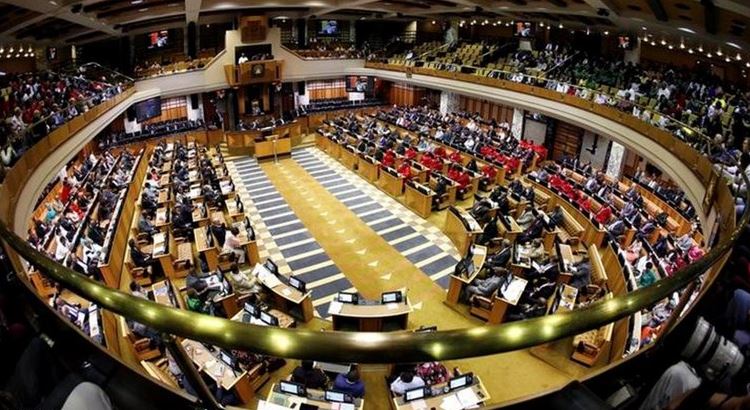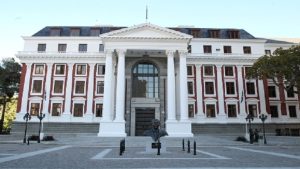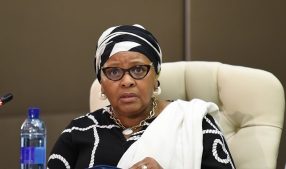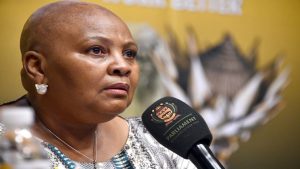Parliament has celebrated the 25th anniversary of the Constitution. The final Constitution was adopted in December 1996 and it came into effect in February 1997.
Parliament held a joint sitting today, to reflect on its values and principles.
Hailed as the world’s best Constitution and anchored in human rights and dignity following decades of colonialism and apartheid, South Africa’s apex document elicits diverse responses.
Twenty-five years since the adoption of South Africa’s Constitution, the country’s lawmakers still don’t agree on its value.
While the vast majority of political parties have described it as a proud achievement, others have equated it to an instrument of oppression and dispossession.
The two Houses of Parliament held a joint sitting debate to mark 25 years of the adoption of the Constitution
In 1996, South Africa’s Parliament held a joint sitting on the occasion of the adoption of its new constitution. Up to the podium walked the then-Deputy President of the country to deliver a landmark oration that has become as iconic as the document itself.
Two and a half decades on, many South Africans are still in awe of this document that they call a living embodiment of their hopes and aspirations.
‘Instrument of freedom’
In opening the debate, International Relations and Co-operation Minister, Naledi Pandor, has hailed those who participated in the drafting of the country’s Constitution.
She has praised leading African National Congress (ANC) leaders such as the late Zola Skweyiya and Kader Asmal for the important role they played. Pandor says opposition party leaders such as Chief Mangosuthu Buthelezi, James Selfe of the Democratic Alliance (DA), Kenneth Meshoe of the African Christian Democratic Party (ACDP) also made a meaningful contribution. Pandor, who took part in a joint sitting debate, says the document unites the people of the country in a manner that no other legal document does.
“Those who shaped our Constitution number millions. Not just those who were in the constitutional assembly. It does not belong to a few. It is our instrument of freedom honouring Kwame Nkrumah, Patrice Lumumba, Sekou Toure. We in parliament and government have a critical role to claim in honour of these men and women and millions of others. We need to consistently ensure that the ambitions of service to the people are honoured and realised,” says Pandor.
Reflecting on 25-years of the South African Constitution
Political parties weigh in
Some of the country’s leading lawmakers were themselves in their youth when the constitution was adopted. Yet they too hold it in high regard.
One of them, DA Chief Whip Natasha Mazzone calls for those who seek to undermine this document to be shunned. She says it is the job of all Parliamentarians who took an oath to uphold the Constitution, should do so.
“It is therefore essential that when this document is undermined we must take it for what it is a treasonous act. We simply cannot have high-ranking politicians making statements that the Constitution should be ignored or is not going to be considered or even more worryingly, not affect their course of action. We should have a collective outrage at such utterances and have the guts to take them and put them where they belong behind bars,” says Mazzone.
Even though Buthelezi has handed the leadership of the Inkatha Freedom Party (IFP) over to new, younger leaders, he continues to be viewed by many of his fellow MPs as an elder statesman whose counsel they value.
He says while he was unhappy about certain provisions of the Constitution, he is happy with the role his party played in its shaping.
EFF criticises Constitution
The Economic Freedom Fighters (EFF) say South Africa’s constitution has done nothing to undo the oppression of black people. The party says, in fact, it has cushioned those who benefited from oppression while millions of black people still live in abject poverty.
EFF National Chairperson Ntombovuyo Mente says the party will not rest until the constitution is amended to allow for the expropriation of land without compensation.
“It draws a moral equivalence between the needs of the dispossessed majority and the interests of the dispossessing minority. It imagines a world where the persecuted live in peace with their persecutors with no redress and no material acknowledgment of the past wrongs. It proclaims to recognise the injustices of our past while at the same time acting as a stonewall around those who perpetrated these injustices and their descendants,” says Mente.
How has government and South Africans upheld the values of the Constitution: Part 1
JOINT SITTING (HYBRID), 28 May 2021 https://t.co/kOOnuU14gZ
— Parliament of RSA (@ParliamentofRSA) May 28, 2021





